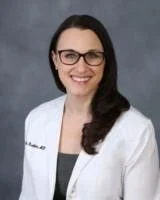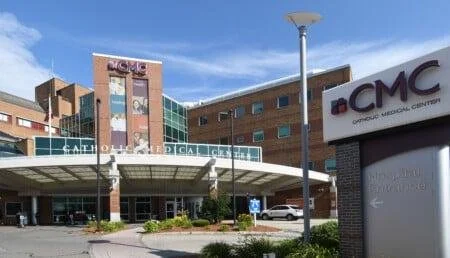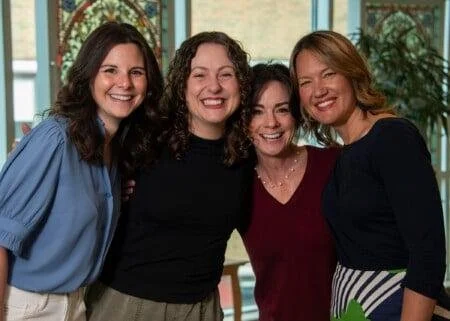While challenges remain, the goal is independence ‘for as long as we possibly can’
By Paul Cuno-Booth, Granite State News Collaborative
As more and more hospitals in New Hampshire become part of larger health systems, a few are bucking the trend.
The growing consolidation of the state’s health care industry — which many hospital leaders say is an economic necessity — has attracted concern from policymakers and advocates, who worry about the impact on patients’ costs and access to care.
For now, CEO Jeremy Roberge and other leaders at Huggins Hospital in Wolfeboro say they’re doing what they can to keep Huggins on its independent course. (Courtesy photo)
In September, Littleton Regional Healthcare became the latest to announce plans to affiliate with Dartmouth Health, saying that would help it expand needed health services in the North Country while better positioning the 25-bed hospital to address challenges such as rising costs.
But at least a couple of New Hampshire’s few remaining independent hospitals say they hope to chart a different path.
“As of right now, our goal is to try our best to stay independent as long as we possibly can,” said Jeremy Roberge, president and CEO at Huggins Hospital in Wolfeboro.
Leaders at Huggins and another small community hospital — Speare Memorial in Plymouth — said that, while they recognize the challenges facing standalone hospitals today, they believe it’s in their communities’ best interests to stay independent so they can make key decisions about health care at the local level, rather than answering to a larger system.
At the same time, leaders of both institutions acknowledged that could change if new challenges arise — including shifts in federal health policy that impact hospitals’ finances.
“We do visit that question frequently to say, ‘Do we affiliate? Do we not affiliate? Do we explore? Do we not explore it?’” said Michelle McEwen, the CEO at Speare Memorial.
McEwen said that, while she can’t rule out affiliation someday, the hospital is currently in a sound financial position and sees no reason to go that route.
‘We felt that it was still in the best interest of our community for us to remain independent,’ says Michelle McEwen, CEO of Speare Memorial Hospital in Plymouth. (NH Business Review photo)
“We just completed our strategic plan [for] the next three years, and this is not part of it,” she said. “We felt that it was still in the best interest of our community for us to remain independent.”
Pressure to grow
New Hampshire, like the rest of the country, has seen a wave of consolidation over the past decade, as once-independent hospitals merged or affiliated with larger health systems.
The national trend toward consolidation has been going on for decades, partly in response to the industry’s growing complexity, said John McDonough, a professor of practice at the Harvard T.H. Chan School of Public Health. Hospital executives also cite reasons like easier access to capital, saving money through bulk purchasing, or increasing their leverage when negotiating with large insurers.
“Running a hospital has become much more complicated than it used to be, with so many more requirements from government payors, from insurance companies, from business clients,” he said. “It’s become quite a burden.”
Financial trouble has also pushed some New Hampshire hospitals to become part of a larger health system in recent years, such as HCA Healthcare’s purchase of Frisbie Memorial Hospital in Rochester in 2020, or Concord Hospital’s acquisition of Lakes Region General Hospital and Franklin Hospital out of bankruptcy the following year. Of the state’s 26 acute care hospitals, only five are unaffiliated, and with Littleton’s pending affiliation, that will leave four.
Alan Sager, a professor of health law, policy and management at Boston University’s School of Public Health, said New Hampshire historically “had the most profitable hospitals east of the Mississippi, partly because each one tended to have a geographic monopoly.”
“But successively, slowdowns in Medicare and Medicaid payment increases may have wounded some hospitals financially, and others suffered, I think, from erosion of physicians as doctors who liked to work there, retired or relocated,” he said.
‘We want to be in control’
For Littleton Regional Healthcare, getting ahead of those challenges was a reason to affiliate with a larger system, said CEO Bob Nutter.
Hospital leaders were seeing shifts in the health care industry that could pose threats to small hospitals like Littleton — including rising costs, changing payment models and challenges with insurers — and wanted to be proactive.
‘As we’re looking down the future and seeing the changes there, and we’re also realizing we’re a critical access hospital,’ said Bob Nutter, CEO of Littleton Regional Hospital. ‘And we can’t be all things to all people without a partnership.” The hospital recently announced its intention to affiliate with the larger Dartmouth Health system. (Courtesy photo)
“We want to be in control and help to drive the future and the needs of the future, as opposed to just kind of being in the boat going down the whitewater of health care and getting tossed around,” he said.
The September announcement that the hospital has signed a letter of intent to join Dartmouth Health was the culmination of a multiyear process of planning for the hospital’s future and exploring possible affiliation options, he said.
The Littleton hospital has always considered itself “wildly independent,” Nutter said. “That being said, as we’re looking down the future and seeing the changes there, and we’re also realizing we’re a critical access hospital. We’re in a rural part of the state. And we can’t be all things to all people without a partnership.”
Retaining some degree of local control was an important consideration, Nutter said. Dartmouth Health will allow Littleton to retain a local fiduciary board that has more power than just an advisory committee.
At the same time, by becoming part of the system, Littleton will be able to do things it couldn’t on its own — such as expanding much-needed health services in the North Country by having more specialists from Dartmouth work there part-time, Nutter said.
He said joining a larger organization will also help the hospital weather future challenges, as well as save money on supplies through greater purchasing power.
“I’m not talking about tens of thousands of dollars in savings,” he said. “We’re talking seven-digit numbers in savings [going] from a small hospital to being part of a family of hospitals.”
Preserving local control
In Plymouth, Speare Memorial Hospital is charting a different path.
McEwen, the CEO, said the hospital intends to remain independent so it can keep making key decisions about strategy and what services its community needs at the local level.
For example, she said, labor and delivery isn’t a big moneymaker, but it’s an essential service for the community.
“We're the only OB program between Concord and Littleton,” she said. “We really see that's a needed service, and would hate to see somebody else making a decision that isn't part of this community, to say, ‘Oh, it doesn't make enough money, we're just going to close it.’”
McEwen said that’s possible only because the hospital’s in solid financial shape, and an affiliation might look more attractive if it was experiencing financial difficulties. And going it alone does come with tradeoffs, like not having the depth of administrative expertise or access to capital of a larger system.
But hospital leaders are committed to preserving the hospital’s independence, and are taking steps to make that possible.
McEwen said clinical partnerships with other providers — such as Dartmouth Health oncology doctors and Concord Orthopedics — have increased access to specialty services locally, while bringing in more patients and revenue. The hospital is also investing more in primary care.
“Those are different areas that we have tried, to one, boost our volume — because that’s still the name of the game, trying to sharpen your finances through higher volume — but also giving our community access to services that they wouldn’t otherwise have,” she said.
‘Independence for as long as we possibly can’
In Wolfeboro, leaders at Huggins Hospital similarly said local control is a key reason for staying independent.
Huggins had been part of the GraniteOne system — along with Catholic Medical Center in Manchester and Monadnock Community Hospital in Peterborough — for about seven years until its breakup almost two years ago.
Roberge, the CEO, said it has been “almost refreshing” to no longer be part of a system.
With GraniteOne, he said, something they thought would be a strength — a loose affiliation in which each hospital still had a great deal of autonomy — turned into its biggest challenge. Each hospital continued making decisions for itself, rather than the good of the whole system, he said, undermining the purported benefits of consolidation, such as contracting as one larger entity.
Roberge said he came away from that experience with the realization that, if the day ever comes that Huggins Hospital needs to join another system, it will need to give up more control for the system as a whole to function well.
But for now, he and other hospital leaders are doing what they can to keep Huggins on its independent course.
“Our plan is independence for as long as we possibly can,” said Chief Strategy Officer Monika O’Clair. “If something happens, new challenges come our way or we just can’t manage those challenges that we have now, we certainly will look for something different. We’re ready to be creative or go back to a different type of operational setup. But this is our plan, and we’re going to really devote our time to this, being independent.”
Challenges ahead?
Huggins serves some of the state’s wealthiest communities along Lake Winnipesaukee, and also benefits from an influx of vacationers every summer who tend to be privately insured.
But Roberge said that doesn’t inoculate the Wolfeboro hospital from the financial pressures facing its peers. The area has stark income disparities, with many lower-income residents as you get farther from the lake, and the hospital cares for a number of patients with Medicaid or are small business owners who can’t afford insurance.
Meanwhile, McDonough, the Harvard scholar, said independent hospitals could be hit hard by the Medicaid cuts passed this year as part of President Trump’s One Big Beautiful Bill Act — along with the expiration of enhanced tax credits that have made Affordable Care Act plans more affordable.
Those changes are expected to drive up the number of uninsured people and increase hospitals’ uncompensated care costs.
Roberge said Huggins will be able to survive the Medicaid cuts, though it will likely take a financial hit.
Speare Hospital’s McEwen is also watching the looming cuts to Medicaid and expiration of ACA subsidies.
“Those could significantly change our resources, our revenues coming in, because we would see an influx of uninsured,” she said. “We don't know how much that will be yet, and we still — let's say, hope and pray, that the subsidies will go back into place for the insurance marketplace.”
But many of the pressures facing hospitals today don’t go away if you’re in a larger system, she said.
“Everything happening in the health care landscape is affecting all of us,” she said. “Whether we’re big, small, independent or part of the system.”










